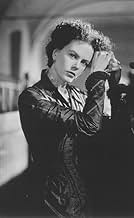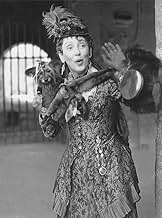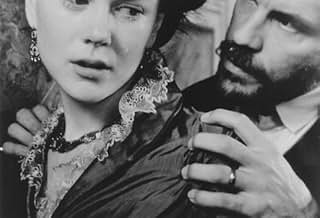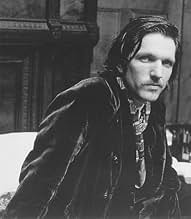IMDb-BEWERTUNG
6,2/10
13.291
IHRE BEWERTUNG
Ein Mädchen erbt ein Vermögen und gerät in eine fehlgeleitete Beziehung mit einem Gentleman, dessen wahre Natur, einschließlich einer widerhakigen und begehrlichen Veranlagung, ihr Leben in ... Alles lesenEin Mädchen erbt ein Vermögen und gerät in eine fehlgeleitete Beziehung mit einem Gentleman, dessen wahre Natur, einschließlich einer widerhakigen und begehrlichen Veranlagung, ihr Leben in einen Alptraum verwandelt.Ein Mädchen erbt ein Vermögen und gerät in eine fehlgeleitete Beziehung mit einem Gentleman, dessen wahre Natur, einschließlich einer widerhakigen und begehrlichen Veranlagung, ihr Leben in einen Alptraum verwandelt.
- Regie
- Drehbuch
- Hauptbesetzung
- Für 2 Oscars nominiert
- 5 Gewinne & 15 Nominierungen insgesamt
Amy Lindsay
- Miss Molyneux #1
- (as Katie Campbell)
Empfohlene Bewertungen
I rented this to get a look at Viggo Mortensen in some of his "other" films. He was beautiful to look at, but probably miscast. The whole movie stumped me. The sets and costumes were sumptuous (I frankly found the sets more interesting to look at than the characters). But this is more a character study than a plot-driven story; the characters should captivate us (or at least interest us) and allow us to come away with an understanding of them. This part failed, for me. Nicole Kidman and John Malkovich seemed to be in a Stone-Faced Acting contest, with Malkovich's monotonous drone matched only by Nicole's insistence on using one solitary facial expression for every "emotion" she supposedly felt. The woman only smiled once, near the end with ill cousin Ralph. What on earth made all these men fall in love with her, and not only fall, but STAY, in Goodwood's case for YEARS? I figured she would be independent and feisty, at least until she allowed herself to fall under Osmond's sway, but... she seemed cold and repressed from the very beginning.
I tried very hard to understand this woman, and at times I could - but only drawing from personal experience, not through anything Kidman offered. And what's up with that ending?? Some people here seemed to get it, but I was left shaking my head, what, that's the last scene?? Oh well, I got to look at Viggo every once in awhile, so it wasn't a total loss.
I tried very hard to understand this woman, and at times I could - but only drawing from personal experience, not through anything Kidman offered. And what's up with that ending?? Some people here seemed to get it, but I was left shaking my head, what, that's the last scene?? Oh well, I got to look at Viggo every once in awhile, so it wasn't a total loss.
When I read DAISY MILLER in high school and was completely unengaged, that set me off the wrong foot with Henry James. I also dislike his over-attentiveness to detail, and I must confess a prejudice against any writer who says in 10 pages what they could just have easily said in 2. Yet THE PORTRAIT OF A LADY, once you get into it, turns out to be quite a powerful novel, and given how much I loved THE PIANO, I was really looking forward to what Jane Campion could bring to it. Rarely have I seen a movie version, though, which is so far off the mark but still has worthy parts to it.
Let's start with the mistakes. Campion claimed she was re-imagining the story of Isabel Archer, an American woman of character but not of means, who eventually marries unhappily, instead of just giving a straight filmed version. That's all well and good, but what she and writer Laura Jones do is all but gut the motivations behind the story; we don't see Archer's vitality early on, so we have nowhere to go when she falls, and we don't see what draws people to her. And when Madame Merle and Osmond appear, they are so obviously snakes in the grass that we think Archer is a fool for trusting them, instead of feeling empathy for her. It doesn't help that Malkovich is so obviously bored here he does nothing to exude any charm. Hershey comes off better, but what's done with her character is a little strange as well.
Nevertheless, this movie can't be easily dismissed. First of all, Campion's gift for imagery still comes through; she visually expresses the passions lying hidden in the novel, which few directors do when adapting period pieces. Also, Kidman grows more confident as the movie wears on, so we do get a sense of Isabel. But as someone already commented, the most worthy element here is Martin Donovan as Ralph, Isabel's sickly cousin in love with her, and whose advice sets the whole story in motion. He doesn't play for sentiment, but earns it instead. The ending also keeps its power. Still, this is quite a missed opportunity for Campion.
Let's start with the mistakes. Campion claimed she was re-imagining the story of Isabel Archer, an American woman of character but not of means, who eventually marries unhappily, instead of just giving a straight filmed version. That's all well and good, but what she and writer Laura Jones do is all but gut the motivations behind the story; we don't see Archer's vitality early on, so we have nowhere to go when she falls, and we don't see what draws people to her. And when Madame Merle and Osmond appear, they are so obviously snakes in the grass that we think Archer is a fool for trusting them, instead of feeling empathy for her. It doesn't help that Malkovich is so obviously bored here he does nothing to exude any charm. Hershey comes off better, but what's done with her character is a little strange as well.
Nevertheless, this movie can't be easily dismissed. First of all, Campion's gift for imagery still comes through; she visually expresses the passions lying hidden in the novel, which few directors do when adapting period pieces. Also, Kidman grows more confident as the movie wears on, so we do get a sense of Isabel. But as someone already commented, the most worthy element here is Martin Donovan as Ralph, Isabel's sickly cousin in love with her, and whose advice sets the whole story in motion. He doesn't play for sentiment, but earns it instead. The ending also keeps its power. Still, this is quite a missed opportunity for Campion.
Nominated for two oscars, but neither one was for the leads. a period piece, in 1872. Nicole Kidman is Isabel Archer, who isn't ready to marry, in spite of the proposals from well to do european gentlemen. a galaxy of co-stars - Malkovich, Barbara Hershey, Christian Bale. her friends and family are concerned, even shocked at the opportunities she's passing up. she meets up with Gilbert (Malkovich), and is intrigued by him. what she doesn't know is that he and Madam Serena (Hershey) are toying with her. some similarities to Dangerous Liaisons, also Malkovich!. this one is a little more complicated, since Gilbert's daughter Pansy is also involved. Portrait of a Lady was one of the last films of Shelley Winters. she's the disapproving old aunt, who thinks Isabel is shameful for passing up these chances. also the other Shelley.... Duvall. lot of talking and discussions. much like a jane austen or Bronte Sisters novel. it's pretty good. strategic mind games, as possible romances are considered or denied. the sound is a bit odd. frequently there is an echo from microphone placement... not sure if that was intentional or not. and many scenes are sparsely lit, so sometimes it's confusing to know who's currently talking. Isabel makes her choices, then has to live with them. life lesson there. directed by Jane Campion... won the oscar for The Piano.
Henry James's "The Portrait of a Lady" stands as one of the greatest psychodramas in literature, a precise and coolheaded dissection of the evolution of a privileged, idealistic if slightly arrogant young woman. This work exemplifies so many qualities which distinguish his view of human nature; he is compassionate, empathetic and observant yet unyielding in exposing the follies, bad judgement and darkness inherent is his characters. No one, especially Isabel Archer, is let off the hook for their misguided choices and her fate is tragic yet completely plausible and, as laid out by James, completely compelling.
A lost opportunity is the best way to describe the film. It is interestingly photographed, full of greys, blues and whites and suggests an almost funereal solemnity in its production design and cinematography. And Nicole Kidman makes a perfect, iridescent Isabel Archer; she looks the part in every respect and certainly conveys the character's intelligence and poignant receptivity to the sights and people around her.
Would that the film had served her better; Jane Campion and the scriptwriter, Laura Jones, eviscerate James's novel but retaining the basic story and structure but put it through the meatgrinder of 90s feminist revisionism. It has been transmogrified into a simplistic tract of victimization and domestic violence, but in doing so Campion and Jones haven't managed to at least raise the story's entertainment value or even create a coherent narrative line for the audience to follow. Rather than present Isabel as a poignant, charismatic figure who unwittingly corrupts her life through bad choices and misguided idealism, the writer and director show us a woman who is victimized by a big bad Man who keeps her locked up in the house, abuses her and steals her money upon duping her into an unhappy marriage. In doing so, James's great work has been drained of its universality and dramatic impact. And while sexual exploitation and gender roles certainly play a part in sealing Isabel's fate in 19th century society, by ignoring the trenchant thematic notions of self determination and the risks of emotional idealism presented by James in his book, we are given a shallow, one-dimensional creation lacking in James's acid edge. Campion cheats a modern audience of discovering filmically a great and still-relevant work by a writer who dared to travel down the darker alleys of a more "civilized" age.
A lost opportunity is the best way to describe the film. It is interestingly photographed, full of greys, blues and whites and suggests an almost funereal solemnity in its production design and cinematography. And Nicole Kidman makes a perfect, iridescent Isabel Archer; she looks the part in every respect and certainly conveys the character's intelligence and poignant receptivity to the sights and people around her.
Would that the film had served her better; Jane Campion and the scriptwriter, Laura Jones, eviscerate James's novel but retaining the basic story and structure but put it through the meatgrinder of 90s feminist revisionism. It has been transmogrified into a simplistic tract of victimization and domestic violence, but in doing so Campion and Jones haven't managed to at least raise the story's entertainment value or even create a coherent narrative line for the audience to follow. Rather than present Isabel as a poignant, charismatic figure who unwittingly corrupts her life through bad choices and misguided idealism, the writer and director show us a woman who is victimized by a big bad Man who keeps her locked up in the house, abuses her and steals her money upon duping her into an unhappy marriage. In doing so, James's great work has been drained of its universality and dramatic impact. And while sexual exploitation and gender roles certainly play a part in sealing Isabel's fate in 19th century society, by ignoring the trenchant thematic notions of self determination and the risks of emotional idealism presented by James in his book, we are given a shallow, one-dimensional creation lacking in James's acid edge. Campion cheats a modern audience of discovering filmically a great and still-relevant work by a writer who dared to travel down the darker alleys of a more "civilized" age.
Many people could not warm up to this remarkable adaptation of Henry James' novel, A Portrait of a Lady. The dark, abusive themes and open ending are not part of typical costume drama fare, but both are true to Henry James' novel and to Jane Campion's vision.
Henry James originally wrote the novel in the 1880s. Intended as an exploration of what a woman might do if she were given independent means, James' book indicts women as being trapped by a weaker nature. Exploring the same material Campion's movie comes to a different conclusion.
The adaptation and direction are superb. The movie maintains the steady rhythm of doom that makes James' novel an enduring classic. There is no place where this is more evident in the film than in its lingering images. The camera holds on to the subject a moment longer than expected, making the viewer a little uncomfortable, and anticipating sudden disaster that never quite arrives. Ms. Campion directs this film like a horror film, which is exactly what it is.
The acting in this film is also convincing, from Nicole Kidman's paralyzed Isabel, to John Malkovich as a hypnotically terrifying pursuer. They are backed by a solid cast of major actors in minor roles, all adding to Isabel's complex societal tragedy.
Portrait of a Lady, particularly this film adaptation, is a remarkable example of how stories may stay the same, but their meanings change over time.
Related films include: Washington Square (1997), The House of Mirth (2000), The Buccaneers (1995)(mini).
Henry James originally wrote the novel in the 1880s. Intended as an exploration of what a woman might do if she were given independent means, James' book indicts women as being trapped by a weaker nature. Exploring the same material Campion's movie comes to a different conclusion.
The adaptation and direction are superb. The movie maintains the steady rhythm of doom that makes James' novel an enduring classic. There is no place where this is more evident in the film than in its lingering images. The camera holds on to the subject a moment longer than expected, making the viewer a little uncomfortable, and anticipating sudden disaster that never quite arrives. Ms. Campion directs this film like a horror film, which is exactly what it is.
The acting in this film is also convincing, from Nicole Kidman's paralyzed Isabel, to John Malkovich as a hypnotically terrifying pursuer. They are backed by a solid cast of major actors in minor roles, all adding to Isabel's complex societal tragedy.
Portrait of a Lady, particularly this film adaptation, is a remarkable example of how stories may stay the same, but their meanings change over time.
Related films include: Washington Square (1997), The House of Mirth (2000), The Buccaneers (1995)(mini).
Wusstest du schon
- WissenswertesFirst collaboration between director Dame Jane Campion and Nicole Kidman. However, it was Campion who discovered Kidman, where she, at the age of fourteen, was performing at Australian Theater for Young People and subsequently caught the eye of Campion.
- Patzer(at around 47 mins) A horse carriage is passing through the shot from right to left. The crew with dolly-cam and equipment is clearly visible.
- Zitate
Ralph Touchett: I love you but without hope.
- Crazy CreditsJane Campion thanks her family, Colin, Alice and Richard, for their generous support, suggestions and encouragement during the making of this film.
- SoundtracksImpromptu in A Flat Major, Op 90 No. 4, D899
(1828)
Composed by Franz Schubert
Adapted for screen by Brian Lock
Performed by Jean-Yves Thibaudet (as Jean Yves Thibaudet)
Courtesy of Decca Records Company Ltd.
Top-Auswahl
Melde dich zum Bewerten an und greife auf die Watchlist für personalisierte Empfehlungen zu.
- How long is The Portrait of a Lady?Powered by Alexa
Details
- Erscheinungsdatum
- Herkunftsländer
- Sprachen
- Auch bekannt als
- The Portrait of a Lady
- Drehorte
- Palazzo Pfanner, Lucca, Tuscany, Italien(Osmond's palace in Florence)
- Produktionsfirmen
- Weitere beteiligte Unternehmen bei IMDbPro anzeigen
Box Office
- Bruttoertrag in den USA und Kanada
- 3.692.836 $
- Eröffnungswochenende in den USA und in Kanada
- 107.819 $
- 29. Dez. 1996
- Weltweiter Bruttoertrag
- 3.692.836 $
- Laufzeit2 Stunden 24 Minuten
- Farbe
- Sound-Mix
- Seitenverhältnis
- 2.35 : 1
Zu dieser Seite beitragen
Bearbeitung vorschlagen oder fehlenden Inhalt hinzufügen




































